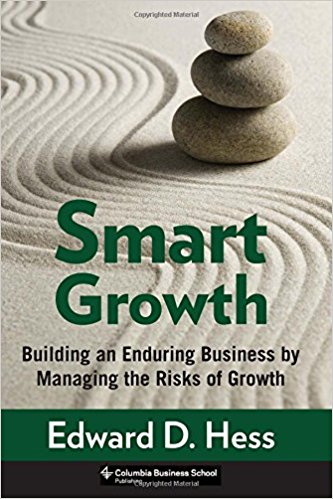Smart Growth Summary
4 min read ⌚
 Building an Enduring Business by Managing the Risks of Growth
Building an Enduring Business by Managing the Risks of Growth
Executives who believed in two possible choices “grow or die,” realized the existence of a secret option number three.
We summarize these three picks and more.
Who Should Read “Smart Growth”? And Why?
According to Hess, many companies continue to conduct a blind worship routine to reach a new stage of growth, while neglecting and manipulating with the earnings in an irresponsible manner.
Managing expectations is somehow becoming a very tricky business, prone to maneuver and deception.
This book is highly recommended for all people willing to learn the secrets of growth on a personal and professional level.
Furthermore, for those keen to get familiar with the reasons causing failure and major setbacks, “Smart Growth” comes as a blessing.
About Edward D. Hess
 Edward D. Hess was born on October 28th, 1947 in Atlanta, US.
Edward D. Hess was born on October 28th, 1947 in Atlanta, US.
He is a renowned professor at the Darden School at the University of Virginia and an author of several books. His writings appeared in more than 100 media outlets worldwide.
“Smart Growth Summary”
“Mental models” are concepts which clarify how individuals work as separate units or in groups; perceive the world floating around them. Occasionally, firms tend to get too optimistic, which is also not advisable.
Your organization needs to be realistic in order to overcome the unstable economy and state regulations. Remaining profitable, and use those retained profits to invest in further production – is what all firms should advocate for.
Processes linked to financing, are often too complicated for adopting an inflexible and rigid attitude. Now and then, information is processed without an eagerness causing disorder and inefficiency.
Marketing is also in one way or another associated with these mental models that shape the companies and corporations. All of a sudden, the marketplace stagnates, and your firm must react – what would be your first reaction?
Take a moment before you answer that question. Recognize the value of fluctuating economy, it’s the only way for the society to progress, but not everyone is happy with that. Suffocating the technological progress has become a societal phenomenon since the 19th century.
All these facts aside, the alignment between information and mental models is equaled to benefits and real value. Why does the author over and over again outline how these two elements correlate? For seeing the big picture, it’s best if you look at the other way around – your brain will not accept a disassociation.
Private companies continue to question this model, leaving little room for improvement. The main reason for this occurrence is the self-uncertainty deriving in the form of distrust. For public corporations on “Wall Street” the best way to measure success is through enforcing rising quarterly earnings, on a constant basis.
Some institutions or professionals same as the investment banking analysts evaluate those future earnings, all leading to a different outcome. For instance, if your corporation exceeds Wall Street’s prognosis, your stock price will experience an instant lift.
In other words, companies must follow the strict rules in order to improve. Nevertheless, if your firm fails to identify the underperforming processes, the stock price falls within seconds.
The Growth Mental Model is undoubtedly becoming one of the most iconic features in the modern world. Businesses driven by profits and desire are aware of the benefits emerging from “do or die” or in this case “grow or die” mentality.
Nowadays, the world of globalization and inconsistency has brought the house down and led many firms to ruins. However, extremely radical this may seem like, it’s the only way leading to prosperity and ultimately profits.
“The Growth Mental Model” is no stranger to risk as well, because the narrative “poem” by which this concept guides itself is pretty robust and simple at the same time: Growth focuses on an utterly straightforward, and optimal perspective, which is consisted of predictable knowledge and preparation.
Hess proposes unique research, case studies, and scholarly exactness to prove that somewhere out there, a better way exists. Morality aside, this also includes a more efficient attitude on a long-term.
Readers are enticed because, economically speaking, nothing is more important than prosperity and profits. “Smart Growth” occurs partially, and yet is doable for companies which emphasize carefully designed projection plans, setting reasonable parameters, and an accurate self-evaluation.
None of these concepts would prove beneficial if there is a shortage of expertise. We as a part of this magnificent journey is amazed by the accuracy and facts existing in this book.
The author underlines some refreshing, all-around viewpoint to business leaders, entrepreneurs, managers, strategy consultants and other decision-makers.
Key Lessons from “Smart Growth”
1. “Smart Growth” and the risk
2. Forget about profits, focus on earnings
3. Vision as an ingredient of growth
“Smart Growth” and the risk
The bottom line is (in both businesses and nature) that growth should always come as an organic, and nurtured unit.
Smart growth is not a theory; it’s more like an option for adding value to all segments. Your firm can grow if, managers or other executives are capable of coping with the burden of risk.
Forget about profits, focus on earnings
Many companies these days, confront the grow-at-all-costs attitude and focus on authentic earnings.
Generally speaking, these organizations have plenty in common: First of all, they share the perfect manager profile – disciplined, passionate, and future-oriented.
Vision as an ingredient of growth
Can you see any visible results, that clearly display your company’s position?
How the company plans to satisfy customer’s needs?
Growth backs the company’s vision and creates a path that should be followed in order for the organization to meet the expectations of all stakeholders.
Like this summary? We’d Like to invite you to download our free 12 min app, for more amazing summaries and audiobooks.
“Smart Growth” Quotes
I think it is in our national interests to systematically promote and enable the building of enduring Smart Growth companies. Share on X Good strategies are not good unless people can execute them...people can only change so much, so fast and so often, and any change will generate mistakes. Share on X Growth can occur without improvement. And improvement can occur without growth. Growth by itself will not prevent a company’s death. Share on X Smart Growth believes that improvement is more important than growth. Share on X Growth should never be an assumed goal. Share on XOur Critical Review
In this enthusiastic, academic thesis, Edward D. Hess – the author of Smart Growth, enforces a dozen different “tools” to bring the “Growth Mental Model” – also recognized as the “grow or die” concept – to its knees.
Emir is the Head of Marketing at 12min. In his spare time, he loves to meditate and play soccer.


 Building an Enduring Business by Managing the Risks of Growth
Building an Enduring Business by Managing the Risks of Growth




